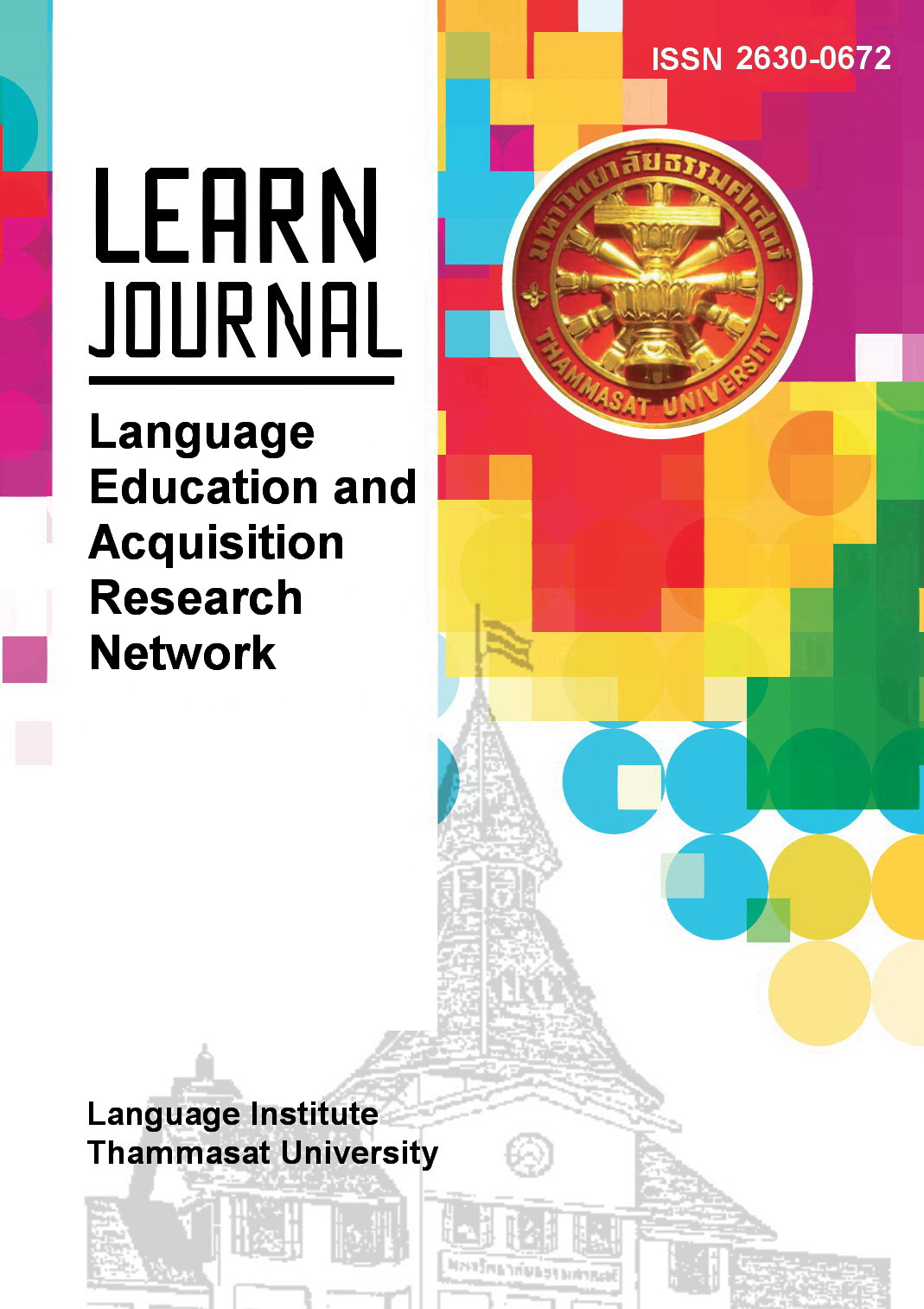Political Communication Apprehension in an Era of Activism: A Survey of Thai Undergraduates
Main Article Content
Abstract
With student activism on the rise in Thailand, deep divisions have formed both at home and school. This study places the modern Thai student in context with a review of the Thai national character and a look at repression and demonization of student activists over the past century. 175 first- and second-year undergraduates at a high-ranking university in Thailand were administered the Personal Report of Political Communication Apprehension (PRPCA). Results show that students exhibit a moderate degree of Political Communication Apprehension. Results of this study can aid in determining the extent to which instructors wish to engage students in political classroom discussions.
Article Details
References
Bourhis, J., Allen, M. T., & Bauman, I. (2006). Communication apprehension: Issues to consider in the classroom. In B.M. Gayle, R.W. Preiss, N. Burrell, & M. Allen, (Eds.), Classroom communication and instructional processes: Advances through meta-analysis (pp. 211–227). Lawrence Erlbaum Associates.
Cacioppo, J. T., & Petty, R. E. (1982). The need for cognition. Journal of Personality and Social Psychology, 42(1), 116-131. 10.1037/0022-3514.42.1.116
Cacioppo, J. T., Petty, R. E, Feinstein, J. A, & Jarvis, W. B. G. (1996). Dispositional differences in cognitive motivation. Psychological Bulletin, 119(2), 197-253. 10.1037/0033-2909.119.2.197
Cole, J. G., & McCroskey, J. C. (2003). The association of perceived communication apprehension, shyness, and verbal aggression with perceptions of source credibility and affect in organizational and interpersonal contexts. Communication Quarterly, 51(1), 101-110. 10.1080/01463370309370143
Daorueng, P. (2021). Students defy Thammasat University campus protest ban. University World News. https://www.universityworldnews.com/post.php?story=2020092315123149
Dela Cruz, A.G., Chu, T., Lee, S. J., & Nithimasarad, C. (2022). Explaining Thailand’s politicised Covid-19 containment strategies: Securitisation, counter-securitisation, and re-securitisation. Journal of Current Southeast Asian Affairs, 41(3), 378-398. 10.1177/18681034221099303
Ferrara, F. (2015). The political development of modern Thailand. Cambridge University Press.
Froese, P., Bader, C., & Smith, B. (2008). Political tolerance and god’s wrath in the United States. Sociology of Religion, 69(1), 29–44. 10.1093/socrel/69.1.29
Hansen, C. (2021). Examining political apprehension. [Unpublished master’s thesis] Brian Lamb School of Communication.
Hayes, A. F., Glynn, C. J., & Shanahan, J. (2005). Willingness to self-censor: A construct and measurement tool for public opinion research. International Journal of Public Opinion Research, 17(3), 298-323. 10.1093/ijpor/edh073
Hewison, K. (2012). Avoiding conflict: Thailand after the Red Shirt uprising. Political Insight, 3(3), 28-31. 10.1111/j.2041-9066.2012.00121.x
Hofstede, G. (1980). Culture and organizations. International Studies of Management & Organization, 10(4), 15-41. 10.1080/00208825.1980.11656300
Hofstede Insights. (2022). Thailand. https://www.hofstede-insights.com/country/thailand
Human Rights Watch (2021, January 13). Thailand: Rights crisis rapidly worsens. https://www.hrw.org/news/2021/01/13/thailand-rights-crisis-rapidly-worsens
Human Rights Watch (2022, July 19). Thailand: Free detained critics of monarchy. https://www.hrw.org/news/2022/07/19/thailand-free-detained-critics-monarchy
Jones‐Carmack, J. (2019). Political communication apprehension: Toward productive political discourse online and face‐to‐face. Journal of Leadership Studies, 13(3), 73-78. 10.1002/jls.21656
Komin, S. (1991). Psychology of the Thai people: Values and behavioral patterns. National Institute of Development Administration (NIDA).
Kongkirati, P. (2006). Counter-movements in democratic transition: Thai right-wing movements after the 1973 popular uprising. Asian Review, 19(1), 1-34.
Mala, D. (2020, August 31). Students find their voice. Bangkok Post. https://www.bangkokpost.com/thailand/politics/1977155/students-find-their-voice
McCroskey, J. C. (1977). Oral communication apprehension: A summary of recent theory and research. Human Communication Research, 4, 78 –96. 10.1111/j.1468-2958.1977.tb00599.x
McCroskey, J. C. (1984). Self-report measurement. In J. A. Daly, & J. A. McCroskey (Eds.), Avoiding communication: Shyness, reticence, and communication apprehension, (pp. 81- 94). SAGE Publications.
Military strips Thaksin of award, calls for ‘good people’ to govern. (2019, March 28). The Nation. https://www.nationthailand.com/in-focus/30366747
Morrell, M. E. (2005). Deliberation, democratic decision-making and internal political efficacy. Political Behavior, 27(1), 49-69. http://www.jstor.org/stable/4500184
Most people still see no-one suitable for PM post: poll. (2021, December 26). Bangkok Post. https://www.bangkokpost.com/thailand/politics/2237983/most-people-still-see-no-one-suitable-for-pm-post-poll
Mydans S. (2019, May 26). Prem Tinsulanonda, former Thai premier and adviser to king, dies at 98. New York Times. nytimes.com/2019/05/26/obituaries/prem-tinsulanonda-death.html
Oxfam, G.B., 2015, “Global Citizenship Guides” – key elements of Global Citizenship, viewed November 2015, from https://policy- practice.oxfam.org.uk/publications/global-citizenship-guides- 620105
Prachatai. (2019, 24 March). “Support good people to rule this country,” says King of Thailand on eve of election. https://prachatai.com/english/node/7990.
Sanglee, T. (2022, January 5). Prayut’s popularity plunges further, but the Thai public can’t name a better option. The Diplomat. https://thediplomat.com/2022/01/prayuts-popularity-plunges-further-but-the-thai-public-cant-name-a-better-option
Sinpeng, A. (2021) Hashtag activism: social media and the #FreeYouth protests in Thailand. Critical Asian Studies, 53(2), 192-205. 10.1080/14672715.2021.1882866
Sripokangkul, S., Crumpton, C.D., & Draper, J. (2020). Demonization and violence as tools of institutional power: The social cage of Thailand. Social Identities, 1–15. 10.1080/13504630.2020.176705
Stryker, R., Conway, B. A., & Danielson, J. D. (2016). What is political incivility? Communication Monographs, 83(4), 535–556. 10.1080/03637751.2016.1201207
Taylor, J. (2021). Thailand’s new right, social cleansing and the continuing military–monarchy entente. Asian Journal of Comparative Politics, 6(3), 253-273. 10.1177/2057891120980835
Thammasat Sustainability (2021). Freedom of speech of Thammasat University tested by students’ political rally. Thammasat University. https://sdgs.tu.ac.th/2021/11/07/freedom-of-speech-of-thammasat-university-tested-by-students-political-rally.
Therriault, A., Tucker, J. & Brader, T. (2011). Cross-pressures and political participation. Paper 23, 1-34. http://opensiuc.lib.siu.edu/pnconfs_2011/23
Ungpakorn, G. J. (2009). Class struggle between the coloured t-shirts in Thailand. Journal of Asia Pacific Studies, 1(1), 76-100.


